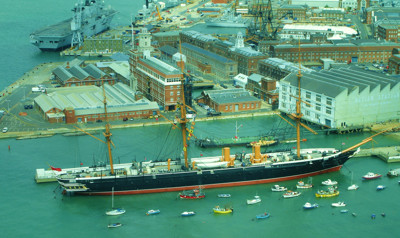Caedes
Upload Images
Welcome guest
Log In or Register
User Stats
- 2 total users online
- 41 users active today
- 265318 total members
- +show users online
HMS WARRIOR - A life on the ocean waves - Portsmouth UK


Dlds: 124
Status: active
If you wanted to serve on board HMS Warrior you needed brawn rather than brain. 600 of the 700 men aboard had tough physical jobs. The average sailor manned the guns, hoisted the sails, turned capstans, hauled on ropes, lifted and lowered boats, pulled on oars and cranked the massive pumps which moved water around the ship. The stokers and trimmers had the worst jobs so were paid 50 per cent more than the others. They toiled in the stokehold in appalling conditions, shovelling tons of coal and ash by hand in temperatures of about 110 degrees Fahrenheit (43 degrees Centigrade). The air was thick with dust, and the noise was indescribable. A large number of the crew helped raise the ship's four anchors located at the bow and stern. Each weighed 5.6 tons, the heaviest ever in maritime history to be operated manually. Over 100 men hauled one anchor up at a time through linked capstans with its chain fed into cable lockers amidships to keep the ship balanced. Another vital task was coaling up. This took place every few weeks when suitable port facilities were available. The job was dirty and complicated, and involved all the crew. The gun deck was cleared with tables up, guns back and ports opened. Seamen and marines filled two cwt (100kg) wicker panniers aboard the collier berthed alongside. The panniers were hauled through the gunports, lifted over the deck and emptied down six chutes to stokers in the bunkers below. Two full days were needed to load the 850 tons of coal. The ship's resident 16 piece band played rousing melodies to keep the crew's morale up. Tons of dry coal blackened the gun deck to such an extent that it took a week to clean up afterwards. The seaman had a daily half pint ration of grog, comprising two parts water to one part rum. It was issued with full ceremony daily at 12.30. In such damp, cold conditions, tuberculosis was common. There were no drugs, so spitting was the only way to clear the lungs. Sailors bought tobacco which they could smoke in a pipe or chewed and spat out. Clothes were issued monthly from the Paymaster and the cost of the uniform deducted from the seaman's wages. The Paymaster was a key figure on the ship. He controlled the victualling, clothes and pay from his lower deck office.